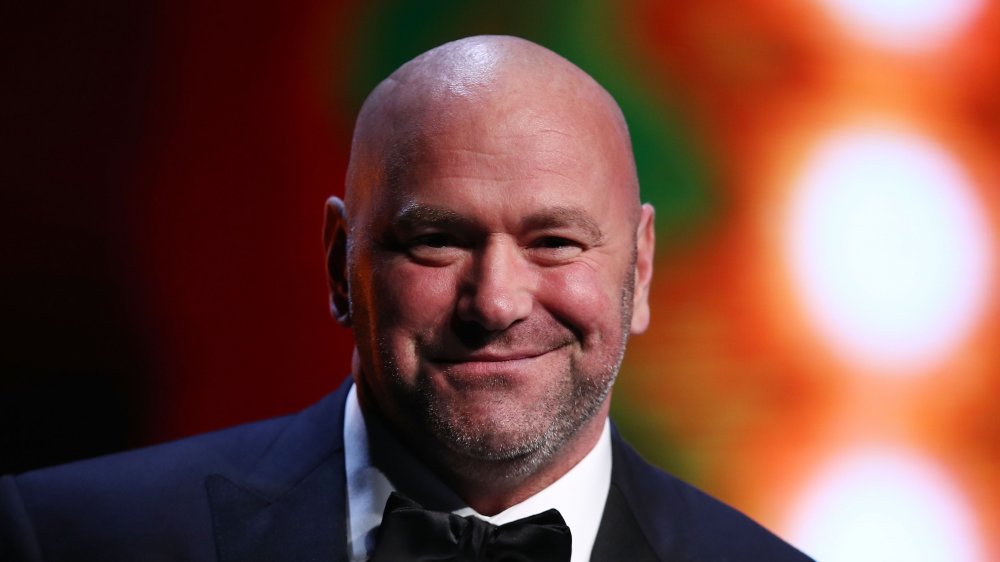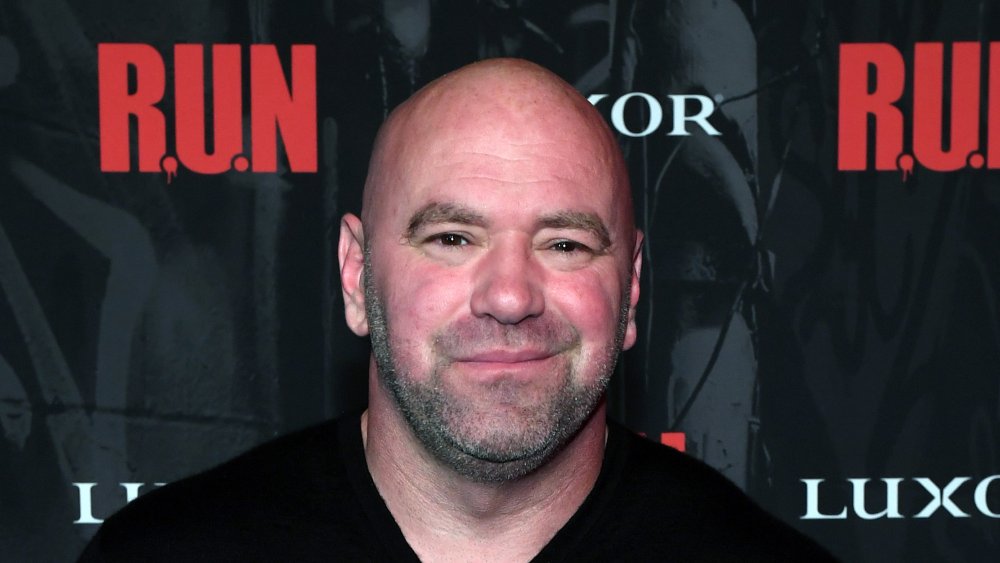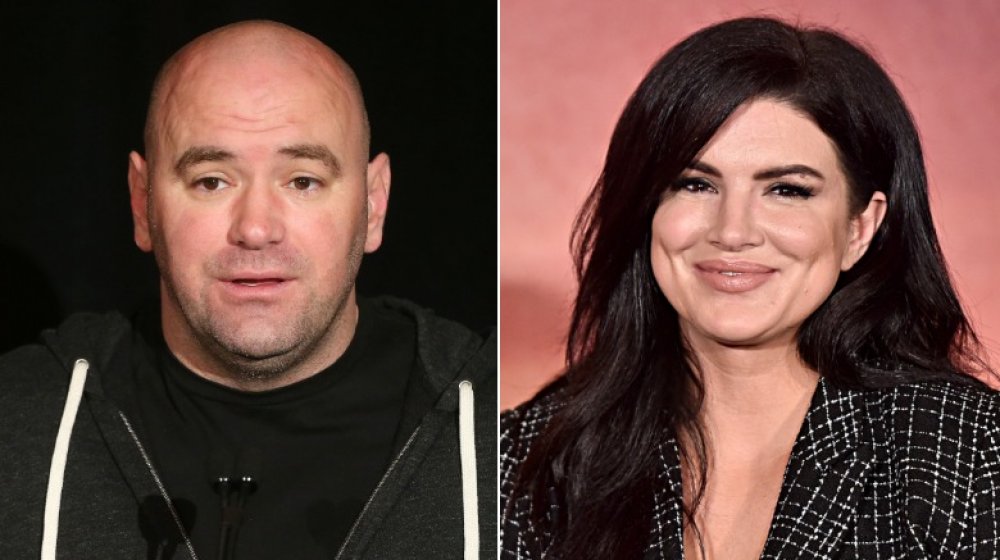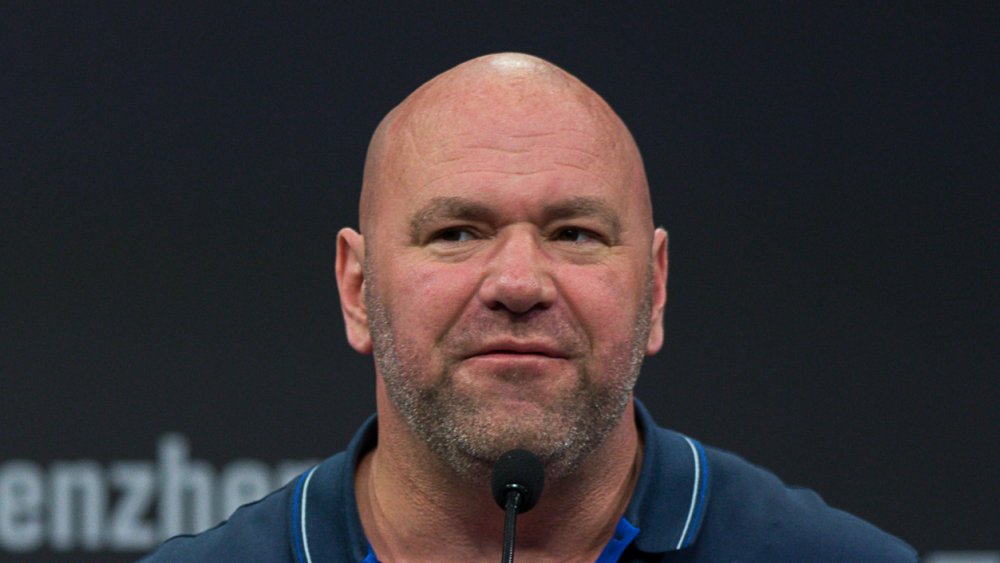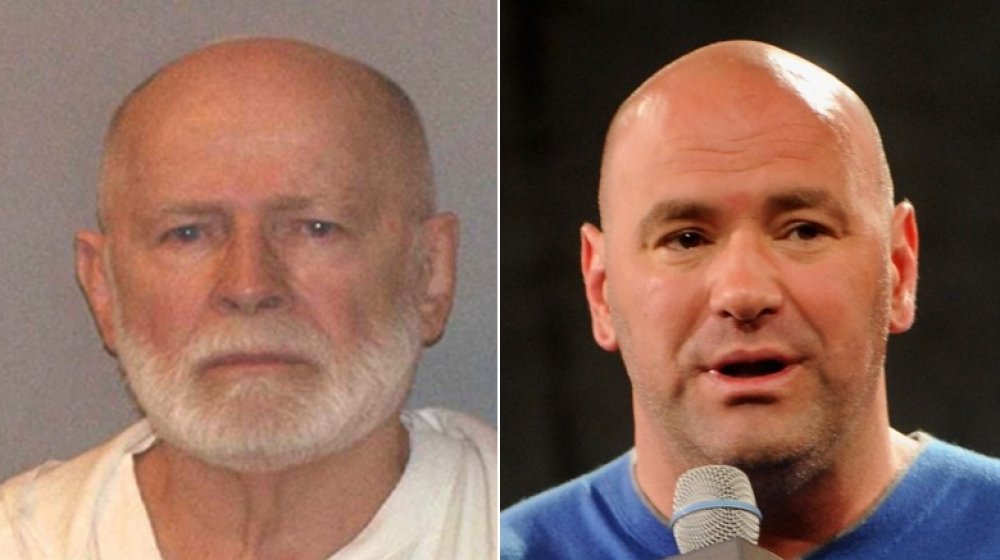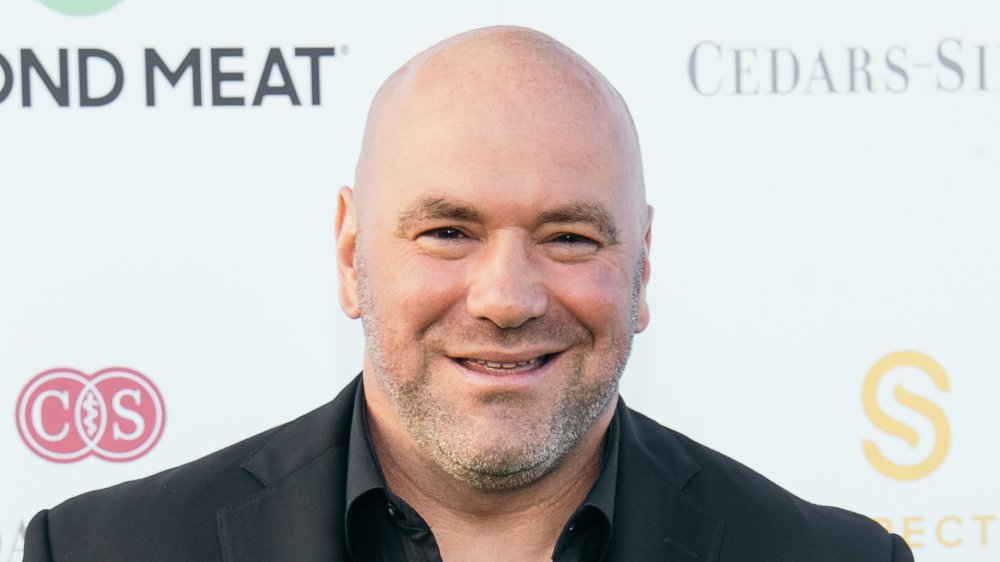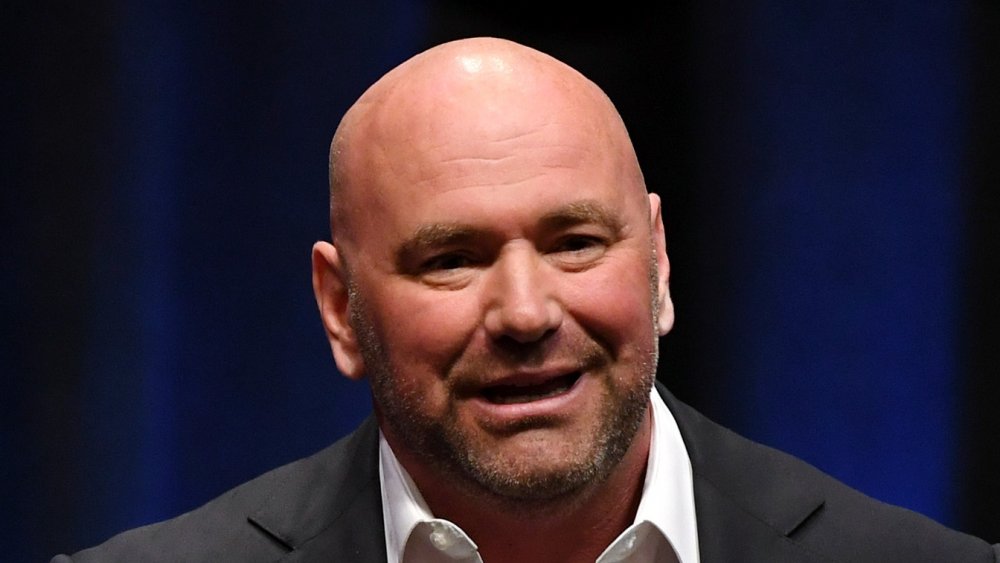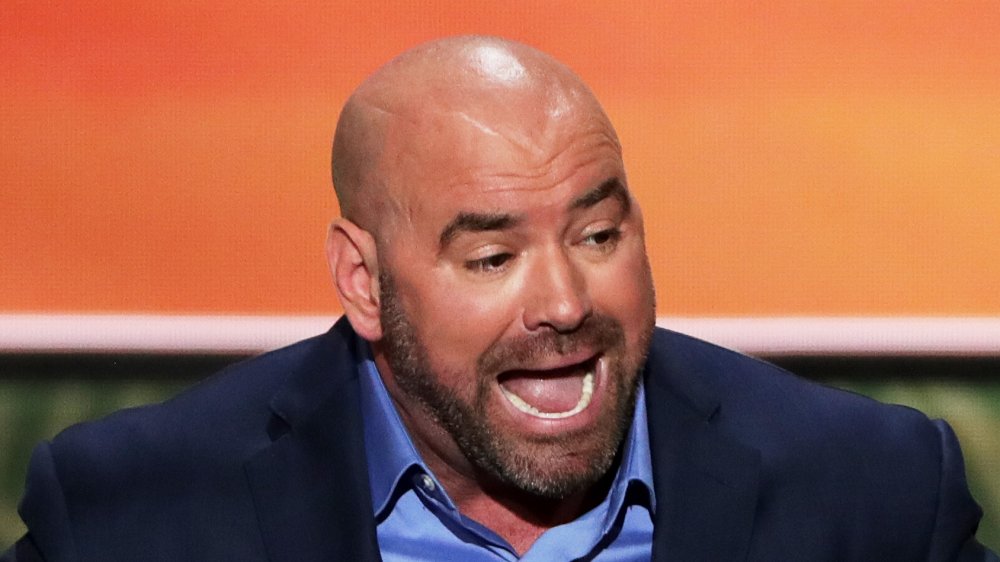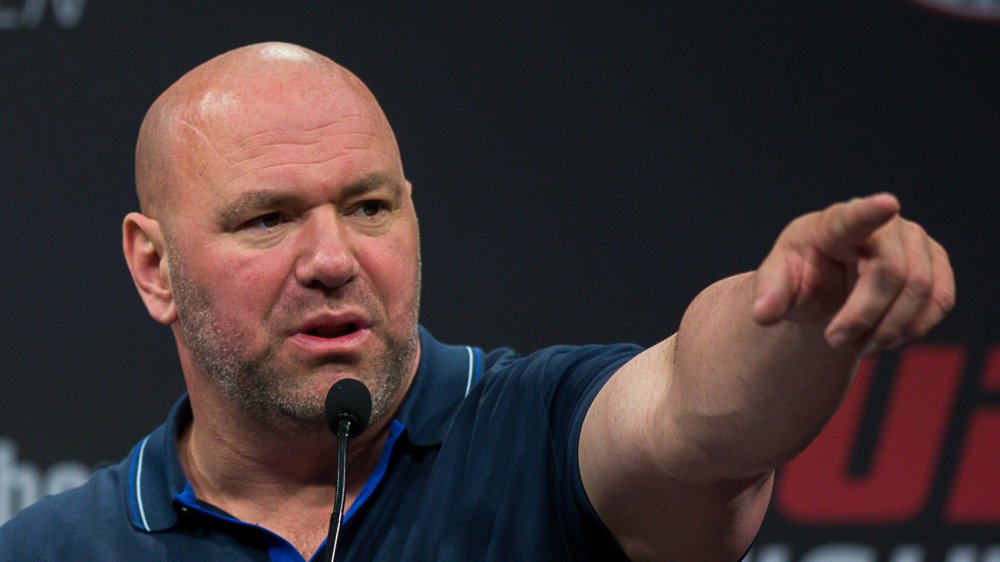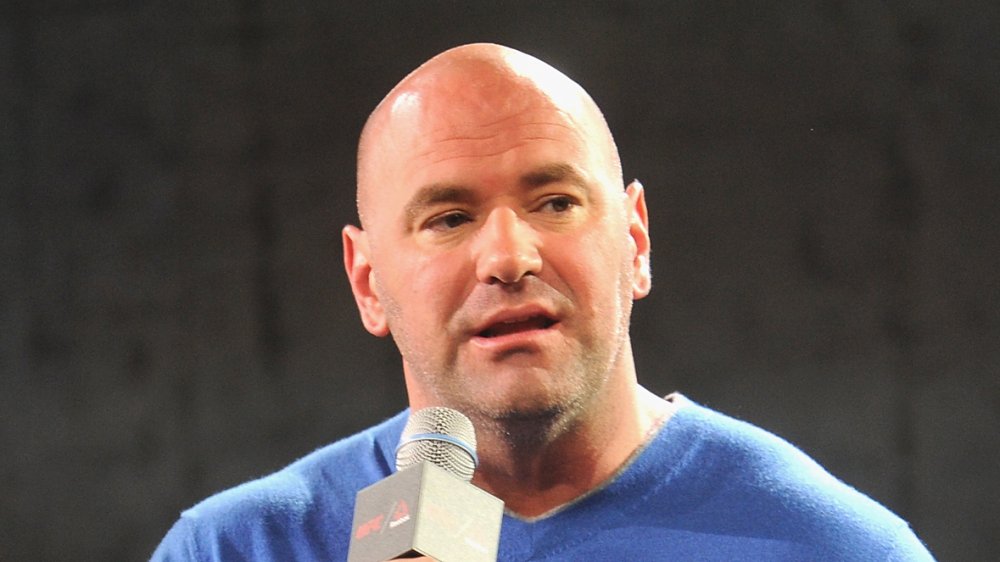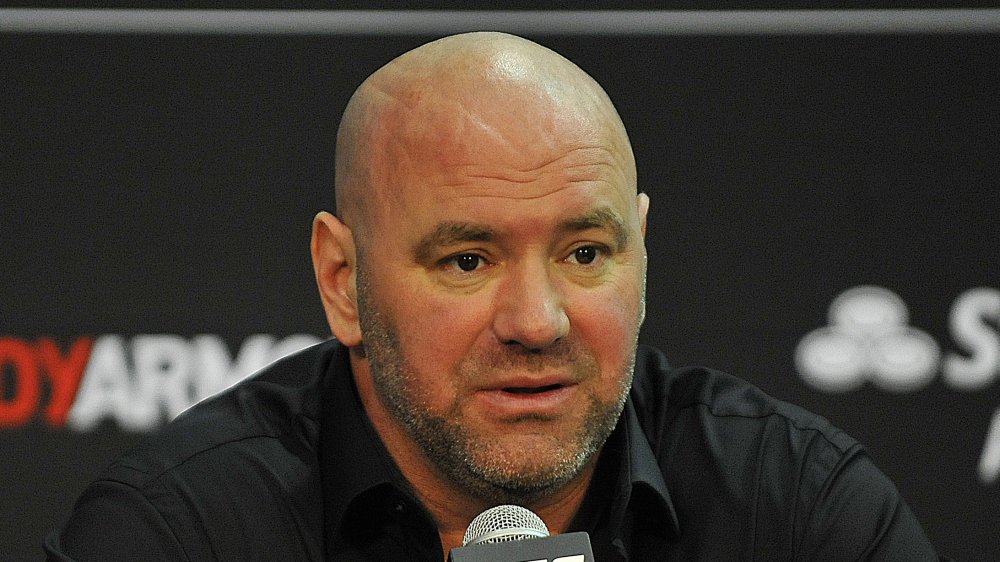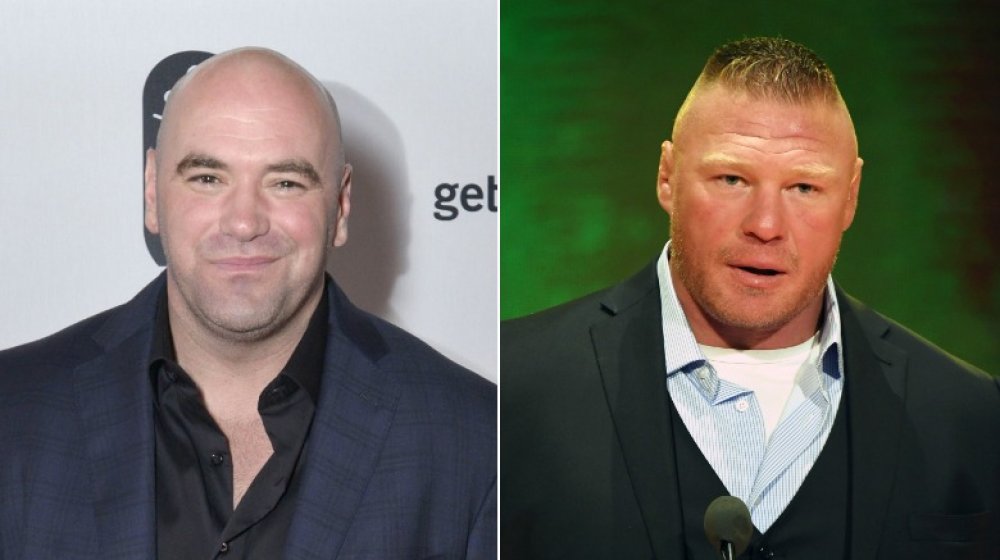The Shady Side Of Dana White
Before former amateur boxer and college dropout Dana White took the reins, UFC fights were an obscure, no-rules, PPV bloodsport, passed around among hardcore martial arts fanboys via VHS tapes, like some kind of semi-legal snuff film. But when Las Vegas hoteliers Lorenzo and Frank Fertitta bought the organization in 2001 and named childhood chum White president, he turned the fledgling combat concept late Senator John McCain once dubbed "human cockfighting" into a globally recognized sports-entertainment mega-brand that today streams exclusively via the Walt Disney-owned "worldwide leader in sports," ESPN.
White today sits astride the fight world on a mountain of cash following the $4 billion sale of the organization in 2016, while retaining control as president. But he didn't accomplish all this without controversy. The bombastic, profane, confrontational promoter is a frequent target of an MMA media that utterly despises him. Once hailed as the savior of the sport, he's now described as the organization's "biggest liability." No stranger to conflict both inside and outside the Octagon, White definitely has a shady side. And some may argue that is part of what has made him a winner, a half-billionaire, and a fan-favorite, in a bloody tough business. Frankly, this list may only scratch the surface.
Dana White allegedly cheats on his wife... a lot
For as public a figure as is Dana White, he tends to keep his personal life close to his broad chest. Despite his best efforts at keeping his private life private, there have been rumors that he's allegedly unfaithful to wife Anne White, whom he wed back in 1996.
Dana's own mother claims his infidelity rivals the most infamous philanderers. "Everyone knows he puts Tiger Woods to shame ... He has plenty of the ring card girls sleep with him. There's two of them I know for sure," claimed June White in 2012 while promoting an unauthorized biography, entitled, Dana White: King of MMA. She went on to further allege, "He slept with his sister-in-law in my house, which made me absolutely furious ... He goes after any girl he wants and usually gets them." June claims Dana's wife was so fed up at one point she punched him on their honeymoon and the promoter nearly lost an eye.
In addition to that alleged abuse — let's note — Dana was also the victim of a $200,000 sextortion attempt in 2015 after a Las Vegas-area stripper secretly recorded a sex tape with Dana on her cell phone, according to the Las Vegas Review-Journal. Her boyfriend was convicted for the scheme, but shockingly, sued Dana in 2020, claiming the promoter promised to pay him $450,000 for keeping quiet back in 2016, in connection to the initial legal inquiry. The galling lawsuit claims Dana and the stripper had an ongoing sexual and financial relationship.
Gina Carano cut ties after Dana White sent a rude text
Before Ronda Rousey became the face of UFC, Gina Carano ruled women's MMA. Beautiful as she is dangerous, her aggressive striking style made her a fan favorite as she tore through Strikeforce contenders in the 2000s. A planned bout between Carano and Rousey would've been a clash of generational greats and could've been one of the biggest fights in company history. But Carano never saw the inside of a UFC Octagon. And she says a profane text from White was the cause.
Carano tentatively agreed to fight Rousey during a dinner with White back in 2014 where she was offered $1 million for the bout. But she'd been acting in films and hadn't fought in five years. She asked White to give her six months to train and put a team together. But Carano says the next day White was out hyping the fight. She texted him to complain and Carano says White responded, "'This b*tch is ... effin' us around,' or something like that," she told ESPN MMA.
Carano thought surely White had sent the text by accident. "So I sent a text message back and said, 'I think that you sent that to the wrong person' and he said, 'I don't think I did' and that was the last conversation that we had over text message because I don't think that was the kind of environment that I wanted to come back into. So I just cut all communication after that text."
Dana White allegedly ditched his own grandmother
Did we mention Dana White's mother isn't exactly his biggest fan? Well, his grandmother probably developed similar feelings after, according to June White at least, her millionaire son abandoned his impoverished nana on her deathbed.
The story goes that the family matriarch, who had been a big part of a young Dana White's life, had fallen gravely ill one summer. The UFC president allegedly hadn't spoken to his aged grandmother for two years but June claims her son finally reached out upon hearing the news she was sick. Dana allegedly promised to send her a private plane and fly her to Las Vegas so she could receive, "the best medical care money can buy." June claims Dana's grandmother was so excited she bragged to all her friends in the neighborhood her famous grandson was about to swoop in and spirit her off to safety.
That's when, according to June, Dana ghosted his own grandma. "And then she never heard from him again," June alleged in an interview promoting Dana White: King of MMA. "And that was typical Dana. So really I didn't even think twice about it." June says Dana's grandmother died shortly thereafter and this incident was the last straw that inspired her tell-all book. But, note, in fairness, this is a woman selling a book defaming her own child, and her allegations are just that.
When asked about his mother in 2012, Dana reportedly called her "a great lady" and had "no thoughts on" her book.
Whitey Bulger allegedly ran Dana White out of town
Being bullied by the mob definitely doesn't mean you're shady. Let's be clear. But it does, perhaps, speak to the hardscrabble milieu that shaped Dana White and his, let's say, self-reliant attitude.
Before White was the biggest promoter in sports, he was a boxing instructor at the Boston Athletic club in the infamous South Boston neighborhood known as "Southie," notorious for organized crime. One day in the early '90s, White was in the middle of a class when two goons for the legendary gangster Whitey Bulger walked in and demanded an audience. White agreed and quickly realized it was a shakedown. According to the promoter, one of the men, now threatening his life, was mobster Kevin Weeks, played by Jesse Plemons in the Johnny Depp version of Bulger's life, Black Mass.
White recalls the mobsters demanded $2,500, which in those days he said might as well have been $25,000. For what exactly? For protection. Protection from whom though? Well, from the mob of course! White couldn't pay and tried to ignore it. Weeks went by. The mobsters called and demanded the cash in one day, or else. "Or what?" White recalls asking. "You'll find out," the mobsters responded, White recalled in an interview with Stadium. White hung up and immediately dialed Delta and booked a one-way flight to Las Vegas. Soon after, Bulger also fled Boston, the FBI hot on his trail. The rest, as they say, is history.
Being good at gambling backfired for Dana White
Dana White is what casinos affectionately refer to as a "whale." He's a high roller with an endless bankroll, and under most circumstances, the lifeblood of the business. But sometimes there's a White-whale, a Dana-shaped Moby Dick figure, equally smooth and dead-eyed under pressure, who can take his chips and turn out the oil lights at even the biggest casinos when he starts blowing hot.
In 2014, White was on such a streak at one of his favorite watering holes, Las Vegas hot-spot the Palms Resort & Casino. And then, they gave him the boot— sort of. White claims he took the house for nearly $2 million so they cut his per-hand bet limit from $25,000 to a mere $5,000 — in a single bet, according to the Las Vegas Review-Journal. For reference, White often wagers more in single hand than he pays fighters to beat each other senseless in the Octagon.
This was actually the second time the UFC president was docked at the resort. The first time, he harpooned the Palms back by pulling UFC broadcasts from their event center. Apparently casino staff was none too happy about the falling out. Besides being a ruthless and shrewd businessman, White is also a legendarily generous tipper: he gave $200,000 to dealers during a three-month hot streak and routinely left $10,000 tips on his dinner bills, according to the Las Vegas Review-Journal.
Dana White allegedly suppresses fighter pay
Maybe you could just call this being good at your job, but Dana White has been expert at keeping your average UFC fighter poor, and hence in need of taking more fights for the same crappy pay. The MMA media has made the issue a cause celeb, to little effect. However, critics have a point: Compared to other leagues, UFC athletes make absolute trash cash. NBA, MLB, and NFL players unions have all negotiated somewhere approaching 50 percent of league revenues, respectively. Hopelessly divided and non-unionized UFC fighters earn a mere 10%, according to an independent analysis.
A more vivid comparison is the case of the sport's biggest star, and fellow shady side haver, Conor McGregor. McGregor's disclosed purse for his final MMA bout was $3 million, according to Forbes. No pittance, but when the Irishman stepped into the boxing ring with Floyd "Money" Mayweather, he took home $85 million — an indication of his actual market value. McGregor has since retired, deciding there's more profit in slinging spirits.
Other superstars concur. Consensus UFC GOAT Jon Jones says he feels ripped off. Top champions like Demetrious Johnson and Henry Cejudo have simply walked away from the promotion or the sport as a whole. The UFC has also ruthlessly gobbled up competing organizations that could start bidding wars that drive up pay. So for now, the issue is mute.
UFC's Reebok deal didn't sit right with fighters
One of the ways UFC fighters traditionally combatted low purses was to pursue outside sponsors to emblazon across their shorts and various ring-walk apparel. Long-time MMA fans will recall the days when each fighter sauntered to the cage with a signature look, like Tito Ortiz in flame shorts and Chuck Liddell's "IceMan" kit.
That all changed in 2015 when the UFC signed an apparel deal with Reebok and fighters were mandated stock uniforms inside the Octagon. Fighters were getting a piece of the action, but the branding deal, which was a big win for Dana White, amounted to a cut in already paltry fighter pay. Legendary former UFC champion Vitor Belfort's team says the deal cost him millions, going on to tell Forbes, "We are pretty much living in slavery. We can't use our own sponsors; they are banned inside the Octagon. We have no properties ... It's a contact sport ... There has to be a retirement plan, which does not exist now."
Forbes went on to describe the system as "exploitative," and cites a 2015 survey conducted by Bloody Elbow which found that seven of nine fighters felt the deal was unfair, and eight of nine said they would lose money. The fighters surveyed estimated the $70 million company deal would cost them, on average, between $20,000 and $25,000 — per fight! Mid-tier but decorated veterans like Ryan Bader say they lost much more
Dana White seemingly runs game on his fighters
Dana White's net worth has climbed to half a billion dollars through 2020, according to Wealthy Gorilla. But that hasn't stopped him from nickel and diming fighters.
Another fairly egregious assault on UFC athlete's ability to make ends meet are the onerous contracts they sign, often waiving rights to their own image in perpetuity. The negotiations are so tough, fighters like John Fitch have been released when they refused these terrible terms, according to MMA Fighting. The fallout with Fitch, which also had something to do with his management company negotiating with another organization, put White in a rage, ranting to Yahoo Sports, "Let [Fitch] go work with them. Let him see what he thinks of those [expletives]. [Expletive] him. These guys aren't partners with us. [Expletive] them. All of them, every last [expletive] one of them."
Perhaps the most concrete example of the rights issue is the UFC's EA Sports video game series, which features every major fighter, without compensating them, according to Bloody Elbow. Or as one fighter put it, "Once again, the UFC has failed to look out for our best interests when negotiating with another company." Fitch also summed up his frustrations similarly, "selling our rights away for a lifetime, that's a little different," he told Yahoo Sports. "We tried to negotiate five or 10-year deals with them, but it wasn't good enough. It was all or nothing. He wanted our lifetime. He wanted our souls forever."
Dana White once said women would never be in UFC
Dana White once called the former undisputed female GOAT Cris Cyborg, "Wanderlei Silva in a dress and heels." If you've ever caught a glimpse of the hulking figure of Silva, AKA, "The Axe Murderer," you know this isn't a compliment. But in fairness to White, he was defending his then-superstar, Ronda Rousey, who didn't want to fight Cyborg because Cyborg had tested positive for steroids. White was arguing, in his own crass terms, but perhaps accurately, that Cyborg, a multiple-time drug cheat, had wrought unnatural muscle development in her misadventures with banned substances.
But that was 2014. By then, Rousey was a proven commodity. Back in 2011, White dismissed women's mixed martial arts as a whole. When TMZ asked if the ladies would ever compete inside the Octagon, his answer was straightforward: "never." That same year, ironically, the UFC purchased rival organization Strikeforce, whose primary breakout star, would be Rousey.
By 2016, a repentant White was calling Rousey, "By far, not even close, by far the biggest star ever," in an interview with Hot 97 (via USA Today Sports). "Never seen that before in my life and will probably never see it again. That's how big Ronda Rousey is." Rousey headlined two of the top ten UFC PPV events of all time, according to Statista, and would go on to be one of the only true crossover stars the sport has ever produced.
No one is safe from Dana White's trash talk
Dana White has a habit of doing a very odd thing for a promoter: he badmouths the fighters he's supposed to be hyping. Here's how it works: as long as you agree to fight who White wants, how he wants, for the money he offers, White loves you. If not, you'll get buried. But fighters also fear ending up like UFC icon Chuck Liddell, who came out of retirement in 2018, at nearly age 50, only to be viciously knocked out.
Liddell had stayed retired for years while holding a ceremonial UFC post that didn't require much actual work. But after the UFC sold in 2016, Liddell was let go, according to MMA Fighting, and The Iceman was soon needing an ice pack. Given the cautionary tales all around, even among legends who once raked it in, it makes sense prime fighters would be picky choosing fights, and fighting styles, to extend their hazardous careers. But when former welterweight champion Tyron Woodley won a tepid stalemate to defend his title at UFC 214, White blasted him, "you ask fans if they want to see Woodley fight again? I think that would be a flat out no. Who wants to pay to see Tyrone Woodley fight again?"
The fight did stink; Woodley was booed mercilessly. But from a fighter's perspective, when so many streams of revenue are monopolized by the UFC, caution might be the better part of valor.
Some rules don't apply to Brock Lesnar, apparently
One of the biggest cash cows to ever compete in the UFC is WWE superstar Brock Lesnar. Despite only nine career fights, Lesnar captured the heavyweight title in 2008, and defended it twice, before succumbing to a superior Cain Velasquez in 2010. Lesnar has also headlined three of the top ten UFC PPV cards of all time, according to Statista.
Lesnar fights so infrequently however, he isn't part of the UFC's olympic-style USADA-run anti-doping (read: steroids) testing pool, announced in 2015, according to Bleacher Report. The random testing protocol means fighters have to enter the program four months ahead of a fight, to ensure they don't simply cycle off performance enhancing substances in time to slip standard in-competition drug-screening.
White and the UFC simply waived these rules for Lesnar ahead of his bout at UFC 200, according to the Las Vegas Review-Journal. Lesnar defeated UFC veteran Mark Hunt but the decision was later overturned to a "no-contest" when USADA announced Lesnar had tested positive for anti-estrogen drugs clomiphene and hydroxy-clomiphene — in two separate tests. One of those tests was conducted two weeks before the fight, according to The Guardian, perhaps indicating further complicity. An outraged Hunt sued the UFC but lost his battle in 2017, according to MMA Fighting. "Someone will die against a steroid using cheater and your sh*t rip off company will be at fault UFC," Hunt posted to Instagram. It was an inglorious end to Hunt's iconic career.

